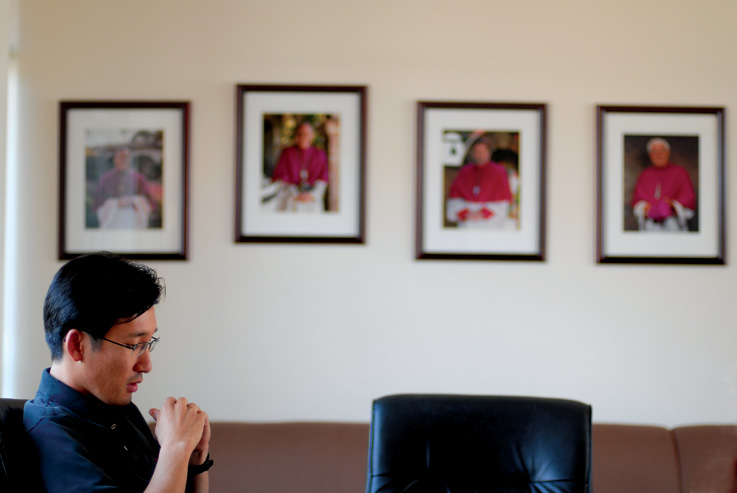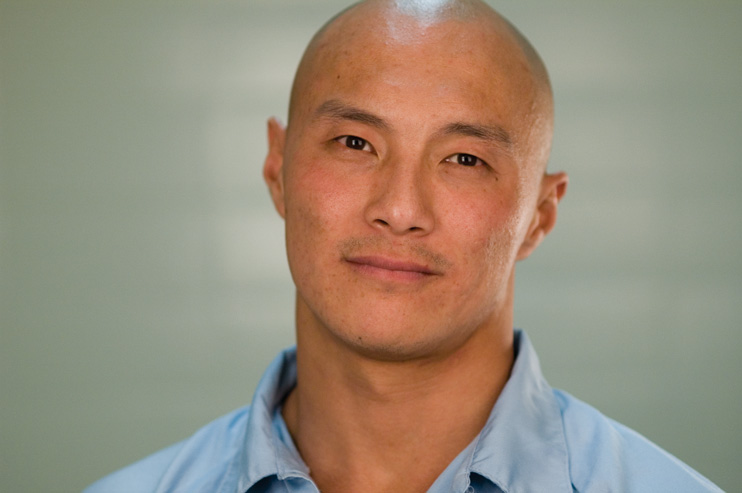By Ellyn Pak
Photographs by Eric Sueyoshi
A line stretches from the entrance of the cafeteria to the front of the room where a young priest awaits.
Parishioners — some going one-by-one, others in groups — shuffle toward Benedict Seyong Yang to receive a first blessing and offer their congratulations on his ordination.
A day like this is momentous not only for the newly-ordained priest, but for a Korean Catholic community that rarely sees one of its own reach such status.
He’s the fourth Korean American to be ordained a priest into the Diocese of Orange, Calif., but on this day, he is more like a rock star.
They shower him with attention, flowers and affection. Some take photos with Yang, who is clad in priest regalia, wearing a lei made of pale green orchids.
Yang, a reticent 30-year-old, is moved by the outpouring of affection from the older parishioners who see him as a point of pride, the young adults he taught and mentored, and the fellow priests who helped him on his journey to priesthood.
***
The spotlight on Yang is warranted. Despite the growing number of Catholic Koreans in the country, the population — estimated at 70,000 — is underrepresented in seminaries and dioceses throughout the nation, making ordinations a rarity and even more significant within the Korean community.
In Orange County, for example, only four diocesan Korean priests, including Yang, serve more than an estimated 5,000 Korean Catholics in the county.
The figures in Orange County may be a microcosm of national trends. More Catholic Koreans are emerging in dozens of communities throughout the country, and there are fewer priests to represent them. Priests from South Korea — where Catholicism dates back 200 years — travel to the U.S. on temporary assignments, but often go back after several years.
More than 10,000 Korean Catholics reside in the Washington, D.C., Maryland and Northern Virginia area, said Fr. Paul Lee, who was the first ordained Korean American priest. Currently, he is a pastor at Epiphany Catholic Church in Washington, D.C.
“Ever since then, some have entered the seminaries with a varying degree of success,” he says. “The number of priests is far insufficient. … We can have a lot more, and I hope more young people consider responding to the Lord’s call. They say it’s not a job. It’s an adventure.”
Lee, 51, who was ordained in 1983 to the Archdiocese of Washington, attributes the lack of Korean American priests to the commitment required to be one.
It hasn’t helped that the Catholic Church has been under fire for reports of molestations by priests, or that the idea of a lifetime of celibacy is difficult to digest by a second generation raised during a “sex sells” era.
Lee says the lack of Korean priests is frustrating.
“People have this relativism, and belief in God is not taken all that seriously. The selfishness has to do with immaturity,” he says. “Committing your whole life to the cause and to God and to the church is a huge commitment. Not many young people are ready to do that.”
“It is a call,” he adds. “You may want to become a priest, but that doesn’t mean you’ll become a priesteither. It’s God’s grace. We’ve got to pray for more priests. We need a lot of sisters too and their great witness to the life that people do not understand.”
***
Yang was raised a Catholic but didn’t always like going to church. Before his family’s move to the U.S. in 1989, his parents warned him that the family needed to go to church often in Korea because they’d be too busy eking out a living in a new country to find a new place of worship.
The Yang family moved to Arcadia in Los Angeles County and lived there for six months until they settled into Temple City, a neighboring city. And despite their previous fears of not being able to find a new church, the family found one.
Yang — who adopted the name Steve but retained his Korean name — did what he could to avoid church as he got older. He even hid in the closet to avoid his uncle, a seminarian who pulled him out and physically forced him to attend Mass.
“You get older, you get stronger, you’re more opinionated. … I said, ‘I’m not going to go,’” he recalls.
Yang was a mediocre student who despised reading and paid his brother to do his book reports for $20. But in 1996, toward the end of his high school senior year, there was one book that caught his attention.
It was a children’s version of the New Testament given to him by a parish sister. He read through the Scriptures and soaked in the information. He was hooked, even ignoring his mother’s pleas to eat dinner to plow through the Bible.
“I read it and I loved it,” he says. “Wow, what a great story. I was shocked. I couldn’t take my eyes off of it. … Reading the Scriptures got me to think there really is a God. It never occurred to me that he could exist or he could be real. Reading the Scriptures challenged me to think.”
Steve began going to church regularly. He taught seventh-grade Sunday school and scolded his parents for being tardy to Mass. He was beginning to get a taste of ministry.
He attended the University of California, Irvine in Orange County and discovered St. Thomas Korean Catholic Center, one of the largest churches in the county, which attracts an average of 1,500 parishioners per week. He developed an interest in the priesthood and sought advice from some of the diocesan priests. The first priest he met was Fr. Alex Kim, who, in 1991, was the first Korean American to be ordained in the county.
“Back then, I did not know what to expect. Now, for example, [Yang] has the ability to talk to a lot of us and hear our experiences. For me, there was no one really to talk to about those things. I was scared. But also because I was the first seminarian, I had a lot of people’s support. People prayed for me. I received a lot of community support,” says the 43-year-old Kim.
Being a role model for young Korean American Catholics was one way to promote the vocation, he says.
“As a priest, I will always look for good candidates for priesthood. If I know some promising people, I ask them, ‘Have you ever thought about being a priest?’ Surprisingly, a lot of times, they say yes.
“Vocation work takes a lot of patience. They might not make a decision now, but five years later, that’s like a seed that’s sown and might grow,” Kim says.
Yang incubated the idea of becoming one of them. In the meantime, his college career was unremarkable. He gradually lost interest in his classes, and his grades began to slip.
“I thought it was irrelevant to my life,” he says. “I didn’t like learning that much except for Scripture and theology.”
He dropped out of school in 1999. He worked as a server at a Korean restaurant in Old Pasadena and got canned for making too many mistakes. He worked as a secretary for a satellite office of a Korean trading company.
The time spent in the real world gave Yang even more motivation to enter seminary school. It was his calling, he says.
He told his mother one day about his decision while she was preparing to make kimchi. She told him she knew when he began his transformation into a more religious young man. His parents wholeheartedly supported his decision to become a priest.
In 2000, Yang entered Mt. Angel Seminary in Oregon and changed his first name to Benedict. Within two years, he transferred to St. John’s Seminary in Camarillo, Calif., where he studied theology. He underwent a yearlong internship at St. Bonafice Catholic Church in Anaheim and went back to St. John’s to finish two more years of theology.
In November 2006, Yang became a deacon. By then he had taken an oath of celibacy, a commitment he says he struggled with in the beginning. By May of this year, Yang completed seminary school.
He was ready to become a priest.
***
Yang’s ordination on June 9 is an elaborate one held at the Holy Family Cathedral in Orange. Christopher Tuan Pham, a Vietnamese American, is being ordained on the same day.
Hundreds of Korean and Vietnamese Catholics from various parishes fill the pews of the cathedral to witness the ceremony. Older Korean women wear hanboks to match the formality of the ordination. Both Yang and Pham’s family members sit in the front pews.
Bishop Tod D. Brown presides over the ceremony, which is filled with a procession, readings, presentation of the candidates, and a series of liturgical prayers asking for the blessing of God.
The actual rite of ordination commences when the bishop places his hands on Yang’s head and prays in silence. Yang and Pham remain kneeled while dozens of already-ordained priests each place their hands on their heads.
“It was so moving to see so many priests from the Diocese of Orange,” Yang later says. “I felt I was part of that community of brotherhood.”
The ceremony continues with a change of robes — with the help of Alex Kim, who is on crutches — and communion.
It is announced that Yang will go to St. Norbert Catholic Church in Orange, and the audience erupts into applause. Toward the end of the ceremony, Yang and Pham bless the bishops and their parents. During the recessional, Yang is met with applause and cheers.
Yang’s priestly duties begin immediately after the ceremony. In the cafeteria adjacent to the cathedral, he lays his hands on the heads of dozens who wait for a blessing.
David Lee, 24, of Irvine, and Mike Yu, 22, of Yorba Linda, are part of a group of young parishioners at St. Thomas and have known Yang for years. They also wait in line to talk to the guy they once knew as “Sarcastic Steve.” The transformation into “Benedict” amuses the guys who know that in person, Yang is a goofy, light-hearted man.
“I knew Benedict before he was in seminary,” David says. “It’s good to see how he’s grown.”
He says Yang is setting an example for young Catholic Koreans. Yang, who works with younger parishioners, is also an ideal person to pass along knowledge about the faith, he says.
Fr. Alex Kim and Fr. Eugene Lee, who was ordained in 2004, watch Yang with pride.
“He’s a younger brother to me and a brother in the priesthood,” Kim says. “It’s a celebration for everyone.”
Lee says he felt proud to be a Catholic during the ordination.
“It was a reminder of my own priestly vows, my own call to the priesthood and to serve God’s people,” he says. “To relive that with a close brother was very moving. I fought back tears.”
A day after the ordination, Yang conducts his first mass in front of 700 people. About a week later, he says he is still trying to settle into his new role. He’s preparing for years of baptisms and masses. Liturgies and weddings. Funerals and confessions.
Of his future duties, Yang says: “There’s a great need, I feel. There’s a lot of work to be done.”







